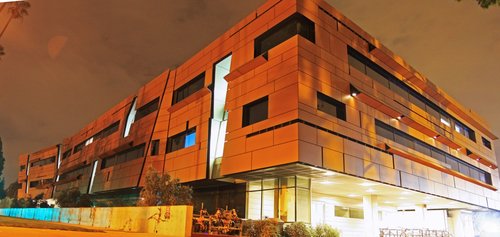Cancer Biomarkers AI and Bioinformatics Workshop
Welcome! This page contains information about the upcoming Cancer Biomarkers AI and Bioinformatics Workshop will be held August 13–15, 2024 at Cahill Hameetman Auditorium, Caltech, Pasadena California.
- Abstracts
- Abstract and poster guidelines
- Final agenda is now available (updated 2024-08-12)
- Hackathon
- Final Presentations (login required)
- Video recordings: day 1, day 2
- Final report of the workshop is now available
For those unable to attend in person, sessions of the workshop will also be held online, virtually.

Purpose of the Workshop
Some of the major advances in the field of cancer over the last few years include a shift towards more data intensive and computational workflows through a variety of tools. This shift is highly relevant for cancer biomarkers. The increase of data and computation coupled with emerging capabilities in bioinformatics, machine learning (ML), and artificial intelligence (AI) is unlocking new opportunities to apply data-driven methods to scientific discovery and validation. Rapid advances in areas such as foundation models and generative AI are providing exciting new capabilities in areas such as image segmentation and identification. As research consortia—such as the Early Detection Research Network (EDRN)—continue to capture more data, there are numerous opportunities to leverage and apply shared tools, algorithms, and capabilities within the community. To leverage these capabilities, there is a need to ensure that diverse datasets are captured, structured, and made readily accessible for analysis. Similarly, there is a need to provide packaged tools and services to support the analysis.
A three-day workshop is being planned at Caltech to gather researchers, practitioners, and experts in cancer science, informatics, and related fields. The workshop is especially relevant for those who are at the intersection of biomarkers and AI. Through a series of keynotes, contributed talks, and extensive discussions around use cases, needs, and capabilities, we plan to develop recommendations to support advancement and application of data-driven approaches to cancer biomarker research. Included in the workshop is a half-day hackathon that will leverage data captured in EDRN’s LabCAS biomarker data commons, as well as other public research data, to explore these computational methods.
Participation
The workshop is open to members of the Early Detection Research Network, academic researchers focusing on AI and cancer biomarkers, and industry partners. Onsite participation is limited to approximately 100 but a virtual option will be offered.
Workshop Goals
- Define use cases and needs for cancer biomarker discovery and validation
- Discuss the state-of-the-art and current gaps in applying AI/ML and bioinformatics methods to cancer biomarker research
- Discuss challenges around reproducibility, interpretability, and explainability
- Discuss current informatics capabilities and infrastructure needs to support use cases
- Develop a set of goals and recommendations to address these needs in cancer biomarker research for the next few years
Workshop Themes
The workshop will cover the following themes:
Theme ①: In Silico and Real World Biomarker Discovery and AI
Covering topics from methodology to application to verification.
- Cancer biomarker discovery — use cases and applications of AI
- Biomarker data (knowledge) Integration: imaging, radiomics, high dimensional data (Proteomics’s, genomics, epigenetics, etc.)
- Showcasing datasets for AI/ML — real world data, synthetic data, and simulated data
Theme ②: Biomarker Computation and Methodology Considerations for applying AI
- Uncertainty, statistical rigor, bias considerations in AI/ML
- Statistical methods vs AI considerations: optimal approaches to enable data analysis
- Trust in ML methodologies for cancer biomarkers: explainability, reproducibility, interpretability of results
Theme ③: Considerations in Data Preparation, Sharing, and Analysis
- Creating AI ready datasets: data preparation, harmonization, and standardization
- Making data usable: data capture, sharing, federation, and scalable computation for cancer biomarkers
- Using open science to link AI algorithms and datasets to publications
- Ethical considerations with data and AI/ML
Theme ④: Emerging Capabilities and Methodologies in AI
- Novel and emerging methods for image analysis
- LLMs/foundation models, generative AI, federation/federated learning
Theme ⑤: Academic-Industry Partnerships in AI and Bioinformatics
- Technology transfer
- Structuring mutually beneficial relationships
Hackathon
The workshop hackathon will leverage data captured in EDRN’s LabCAS biomarker data commons as well as other public data resources for hands-on application. The hackathon will include both programming/hacking and ideation/brainstorming about combining diverse datasets for specific big questions that may have been considered out of reach just a few years ago. This expanded scope opens the hackathon to both bioinformatics experts and investigators of all levels and technical expertise interested in learning more about the application and use of various bioinformatics and AI/ML tools and methods for cancer biomarker research..
Key Dates
| Item | Date |
|---|---|
Announce Workshop / Call for Abstracts |
March 1, 2024 |
Abstract Submissions Due |
May 6, 2024 |
Registration Open |
June 1, 2024 |
Authors Notified |
June 15, 2024 |
Final abstracts due |
July 8, 2024 |
Registration Closed |
August 2, 2024 |
August 12, 2024 |
|
Workshop |
August 13–15, 2024 |
Logistics and Travel
Information on logistics for the meeting is available, including:
Program Committee
- Jennifer Ellen Beane-Ebel (Boston University)
- Paul Boutros (UCLA)
- Daniel J. Crichton (NASA JPL)
- Ziding Feng (Fred Hutch Cancer Center)
- Chad He (Fred Hutch Cancer Center)
- Heather Kincaid (NASA JPL)
- Eugene Koay (MD Anderson Cancer Center)
- Ashish Mahabal (Caltech)
- Anirban Maitra (MD Anderson Cancer Center)
- Christos Patriotis (NIH/NCI)
- Matthew B. Schabath (Moffitt Cancer Center)
- Amanda Skarlupka (NIH/NCI)
- Steven Skates (MGH)
- Sudhir Srivastava (NIH/NCI)
- Zhen Zhang (JHMI)
Questions
Questions? Reach out to the EDRN AI Workshop Planning Panel by email.
